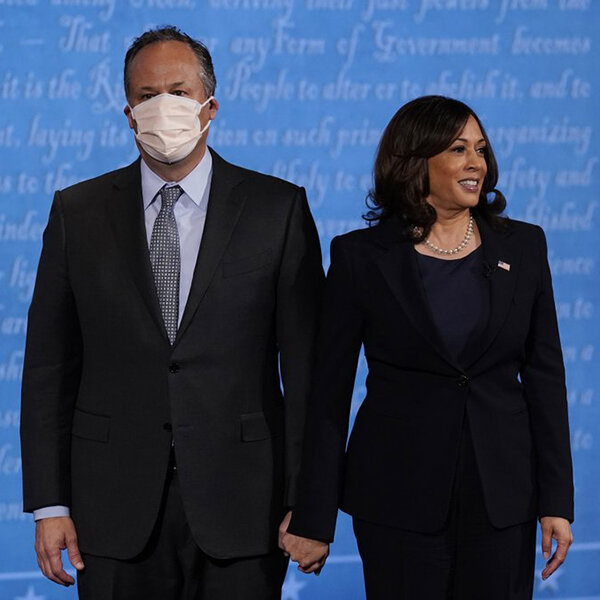Harris becomes first Black woman, South Asian elected VP
AP
By KATHLEEN RONAYNE // EEW Magazine Online
Kamala Harris made history Saturday as the first Black woman elected as vice president of the United States, shattering barriers that have kept men — almost all of them white — entrenched at the highest levels of American politics for more than two centuries.
The 56-year-old California senator, also the first person of South Asian descent elected to the vice presidency, represents the multiculturalism that defines America but is largely absent from Washington’s power centers. Her Black identity has allowed her to speak in personal terms in a year of reckoning over police brutality and systemic racism. As the highest-ranking woman ever elected in American government, her victory gives hope to women who were devastated by Hillary Clinton’s defeat four years ago.
In this Oct. 7, 2020, file photo, Democratic vice presidential candidate Sen. Kamala Harris, D-Calif., stands with her husband Douglas Emhoff during the vice presidential debate. (Credit: AP Photo/Patrick Semansky)
Harris has been a rising star in Democratic politics for much of the last two decades, serving as San Francisco’s district attorney and California’s attorney general before becoming a U.S. senator. After Harris ended her own 2020 Democratic presidential campaign, Joe Biden tapped her as his running mate. They will be sworn in as president and vice president on Jan. 20.
Biden’s running mate selection carried added significance because he will be the oldest president ever inaugurated, at 78, and hasn’t committed to seeking a second term in 2024.
Harris often framed her candidacy as part of the legacy — often undervalued — of pioneering Black women who came before her, including educator Mary McLeod Bethune, civil rights activist Fannie Lou Hamer and Rep. Shirley Chisholm, the first Black candidate to seek a major party’s presidential nomination, in 1972.
“We’re not often taught their stories,” Harris said in August as she accepted her party’s vice presidential nomination. “But as Americans, we all stand on their shoulders.”
That history was on Sara Twyman’s mind recently as she watched Harris campaign in Las Vegas and wore a sweatshirt featuring the senator’s name alongside Chisholm.
“It’s high time that a woman gets to the highest levels of our government,” said Twyman, who is 35 and Black.
Despite the excitement surrounding Harris, she and Biden face steep challenges, including deepening racial tensions in the U.S. in the wake of a pandemic that has taken a disproportionate toll on people of color and a series of police killings of Black Americans. Harris’ past work as a prosecutor has prompted skepticism among progressives and young voters who are looking to her to back sweeping institutional change over incremental reforms in policing, drug policy and more.
Harris is the second Black woman elected to the Senate. Her colleague, Sen. Cory Booker, who is also Black, said her very presence makes the institution “more accessible to more people” and suggested she would accomplish the same with the vice presidency.
Harris was born in 1964 to two parents active in the civil rights movement. Shyamala Gopalan, from India, and Donald Harris, from Jamaica, met at the University of California, Berkeley, then a hotbed of 1960s activism. They divorced when Harris and her sister were girls, and Harris was raised by her late mother, whom she considers the most important influence in her life.
Harris’ mother raised her daughters with the understanding the world would see them as Black women, Harris has said, and that is how she describes herself today.
She attended Howard University, one of the nation’s historically Black colleges and universities, and pledged Alpha Kappa Alpha, the nation’s first sorority created by and for Black women. She campaigned regularly at HBCUs and tried to address the concerns of young Black men and women eager for strong efforts to dismantle systemic racism.
Her victory could usher more Black women and people of color into politics.












